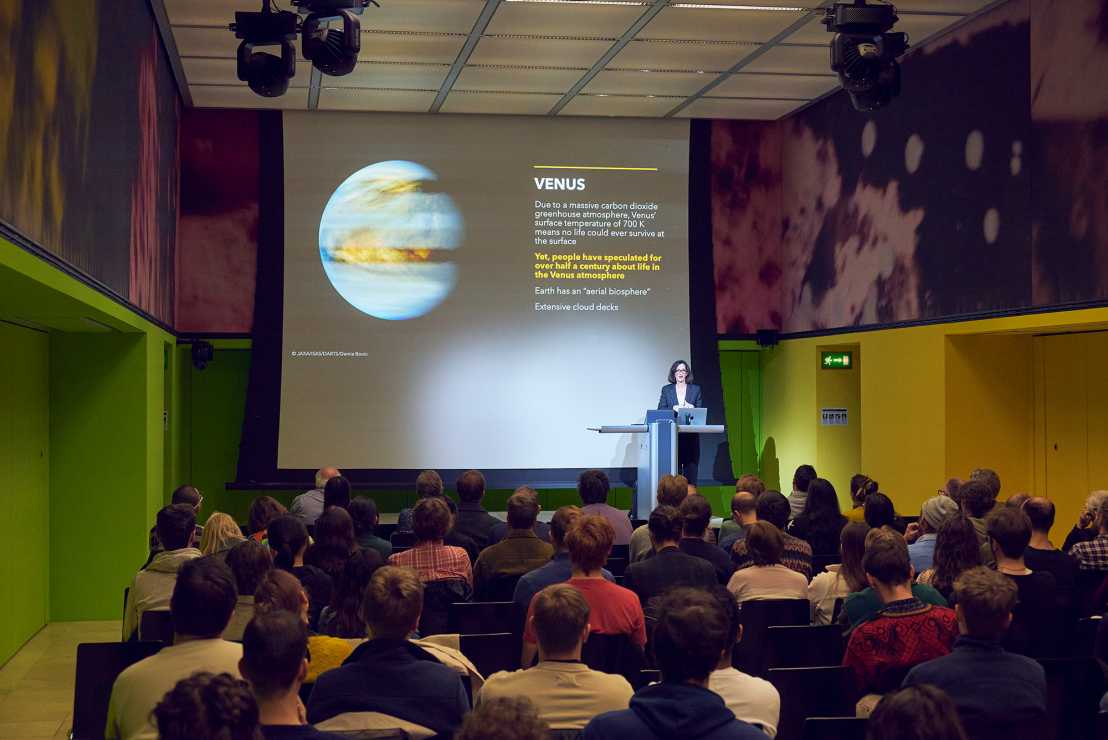The search for life on Venus
As the speaker of the third edition of the COPL Colloquia, Sara Seager presented her current research on the atmosphere of Venus, showing how its chemistry and cloud characteristics are compatible with Venusian life.

Oscillating above the line that separates the mainstream from the unconventional, Sara Seager admits that her research has often positioned her on the crazy side. Studying the atmospheres of exoplanets was unimaginable 29 years ago, when Seager started her PhD in exoplanet research – yet it has become a cornerstone of modern astronomy. “We all obviously forged ahead, and now we are here today. The line is constantly shifting,” Seager concluded, emphasising the need to push the boundaries of what is conceivable.
Professor Seager's current research into the atmosphere of Venus is no exception to such limit-pushing science, and it was with a warning that she began her talk at the COPL Colloquium: “We’ll be on the crazy side of crazy”.
Venus’s atmospheric mysteries
Considering Venus – a planet with a harsh atmosphere, rich in sulphuric acid clouds – as potentially habitable is intriguing, yet not impossible, Seager said. The many unexplained phenomena in Venus’ atmosphere, many of which were discovered in decades past, could indicate the possibility of life. Some of these mysteries include the absorption of half the incoming sunlight by the so-called “unknown UV absorber”, non-spherical cloud particles whose shape suggests they are not pure sulphuric acid, or the reported detection of trace amounts of gases such as phosphine, ammonia, and oxygen – all unexpected in such an environment.
The feasibility of life in sulphuric acid clouds
Going further, Seager is also challenging the prevailing view that Venus's highly acidic atmosphere precludes life. What started as an outdoor lab experiment in the pandemic summer with her 17-year-old son turned into extensive laboratory experiments showing the surprising stability of several classes of biomolecules – amino acids, some dipeptides, and nucleic acid bases – in concentrated sulphuric acid. While DNA is unstable, Seager's team discovered that a single strand of peptide nucleic acid (PNA), another information polymer, is stable in concentrated sulphuric acid, substantiating the idea that the Venus clouds might be able to host life.
“But maybe it's not so crazy – a new paradigm for sulphuric acid as a potential solvent for life.”Professor Sara Seager
Further research has shown that even vesicles, akin to rudimentary cell membranes, can form and remain stable in this environment. "Remember, this is the crazy side of crazy," Seager reminded her audience, and continued, "but maybe it's not so crazy – a new paradigm for sulphuric acid as a potential solvent for life."
The Morningstar Missions to Venus
What drives all this research is clear to Professor Seager: “We want to go to Venus,” she explained. Seager is leading the Morningstar Missions to Venus team – a series of planned missions designed to investigate the possibility of life in Venus’ clouds. The first mission, a collaboration with Rocket Lab, is a small, low-cost probe launching in 2026 that will measure autofluorescence and backscattered polarised radiation to detect the presence of organic molecules in the clouds. A more ambitious second mission involves a balloon-based platform to collect larger samples for mass spectrometry. Seager emphasised the shift towards smaller, more focused missions, as opposed to large, complex endeavours. The overall goal is to encourage more frequent and targeted missions to Venus and other Solar System bodies.
While some results have already been obtained in the lab that suggest that organic molecules might exist in the Venusian atmosphere, the team faces hurdles such as developing a robust sampling system for the balloon mission and securing funding for the larger-scale initiatives. Despite the challenges, Sara Seager’s enthusiasm underscores a renewed interest in exploring Venus and its potential to harbour life: “I hope I've convinced you that Venus is something one should obsess over.”
